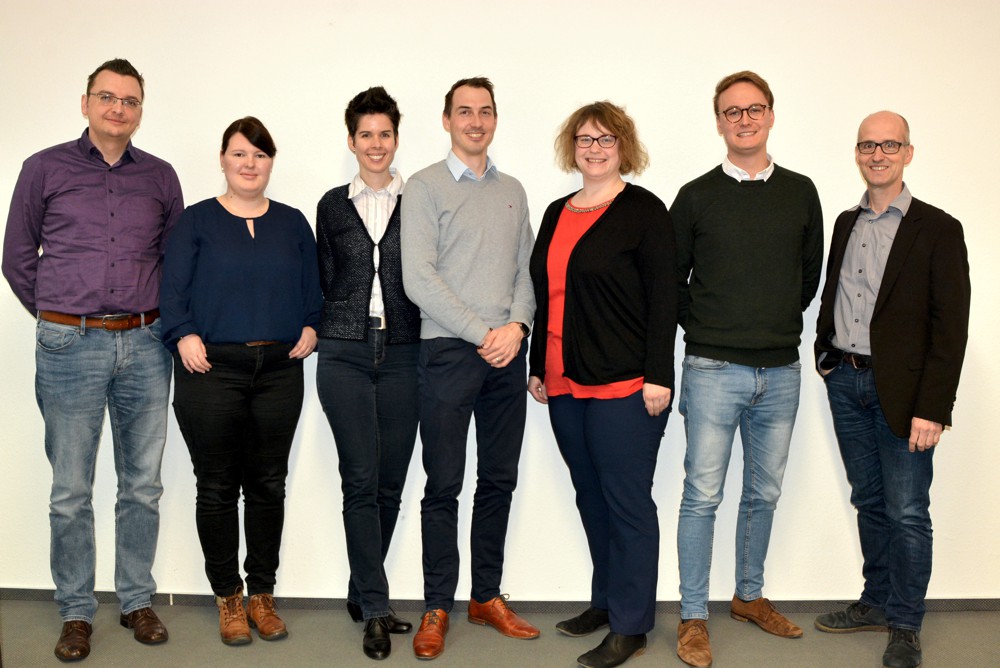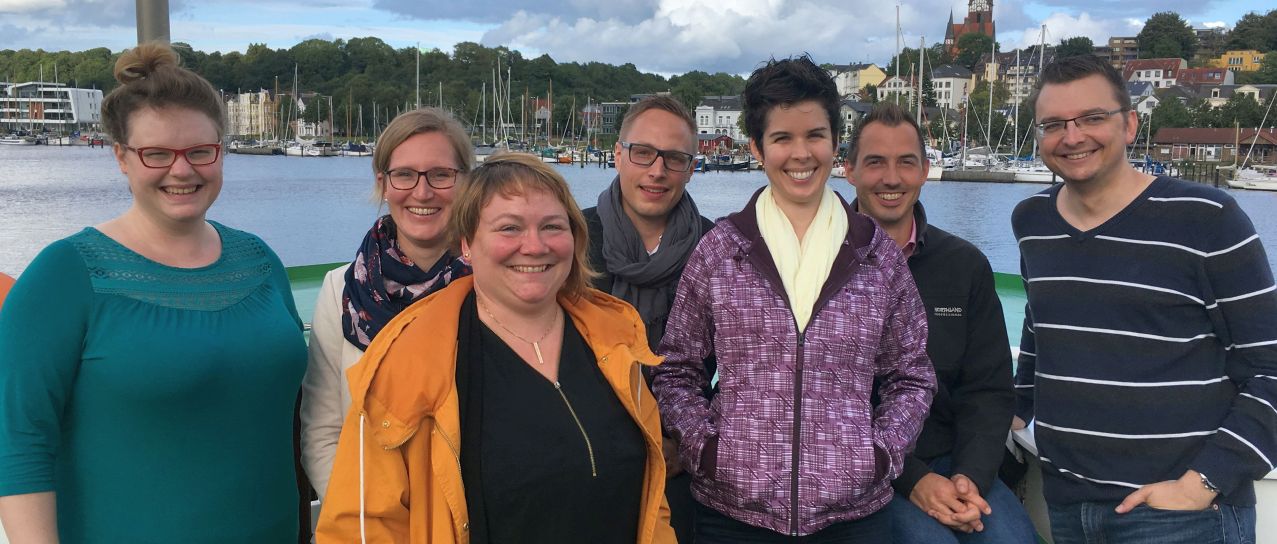Working group meeting in Bochum
On Friday, 21st February 2020, the working group met for its annual working meeting at the premises of ZTG GmbH in Bochum. The aim of the meeting was to continue the previous scientific and practice-oriented exchange, to discuss current developments and to intensively focus the activities of the WG CHI this year. At this point, we would also like to thank the ZTG for their great hospitality and support!
After a brief welcome and introduction, the seven participants first discussed the workshop and the GMDS & CEN-IBS Invited Session planned by the WG as part of the GMDS Annual Conference on 10th September 2020 in Berlin. Since the WG would like the audience to be broad and interdisciplinary, the WG would like to encourage as many and as diverse decision-makers and stakeholders in the healthcare sector as possible to attend the workshop and to actively contribute their expertise. The WG leadership will provide information on this in the coming weeks.
The event entitled "DIY Digital Health - Do we just help ourselves?" is designed as a double session, so that conference visitors can participate in both sessions or attend only one part. The event focuses on the phenomenon that citizens and patients are increasingly taking their care into their own hands by means of digital technologies or even developing their own technologies and thus increasingly influencing traditional healthcare. By inviting external speakers from different areas of health care and civil society and actively involving the audience, the session should offer plenty of room for interesting and also controversial discussions on the topic of consumer health informatics.
In addition, the participants also reported on their current work priorities in order to filter out any cooperation or synergies and to promote interdisciplinary exchange within the working group. The working group itself is also very interested in networking with other working groups on related topics, so networking possibilities were also discussed intensively at the working meeting.
Afterwards, the participants agreed that the topic of consumer health informatics will continue to be relevant in the future, especially against the background of current legal and political developments - keywords here are, for example, the Digital Care Act, electronic patient files, data donation, app on prescription, etc. - and that it therefore seems more than worthwhile to position oneself actively in this field.
 Participants of the working meeting (from left to right): Martin Wiesner (Heilbronn University of Applied Sciences), Saskia Niemöller (Osnabrück University of Applied Sciences), Monika Pobiruchin (Heilbronn University of Applied Sciences), Björn Schreiweis (Christian-Albrechts-Universität zu Kiel, University Hospital Schleswig-Holstein), Veronika Strotbaum (ZTG GmbH, Bochum), Benjamin Kinast (Christian-Albrechts-Universität zu Kiel, University Hospital Schleswig-Holstein), Jochen Meyer (OFFIS, Oldenburg).
Participants of the working meeting (from left to right): Martin Wiesner (Heilbronn University of Applied Sciences), Saskia Niemöller (Osnabrück University of Applied Sciences), Monika Pobiruchin (Heilbronn University of Applied Sciences), Björn Schreiweis (Christian-Albrechts-Universität zu Kiel, University Hospital Schleswig-Holstein), Veronika Strotbaum (ZTG GmbH, Bochum), Benjamin Kinast (Christian-Albrechts-Universität zu Kiel, University Hospital Schleswig-Holstein), Jochen Meyer (OFFIS, Oldenburg).
Working group meeting, 10th September 2019
For the annual working group meeting 2019, the WG leadership welcomed 12 participants, including "new faces". The WG leadership gave a short review of the activities of the last 12 months, which were always reported on in the GMDS news pages. Afterwards, possible publication and application projects were discussed, which were subsequently concretised and taken further.
No elections were held.
Workshop at the GMDS conference, 10th September 2019
The WG organised the workshop "First to the doctor or straight to the app?!" at the 64th Annual Conference to discuss the possible effects of an increasingly digital health system. In particular, the aim of the event was to discuss whether and how changing patient lifeworlds affect the doctor-patient relationship.
To start with, the workshop offered insights into those fields of health care that are already experiencing the effects of digitalisation and in which citizens and patients are sometimes active themselves.
The workshop was written up in the form of a "Workshop Report". The report summarises the keynote presentations and discussion results and can be obtained under DOI: 10.13140/RG.2.2.23361.51041.
Autumn Meeting, 8th November 2018
On 8th November 2018, the WG met for this year's autumn meeting with the aim of further specifying the WG's work content and developing promotional/presentation materials for the WG. The meeting was organised by and in the Medical Information System Department of Heidelberg University Hospital, to whom we would like to express our sincere thanks once again. The meeting focused in particular on the development of a flyer on the goals and typical questions of the research field of Consumer Health Informatics. The flyer is intended to provide brief information about the research field and the WG and is aimed at interested parties within and outside the GMDS.
Interdisciplinary workshop at the GMDS conference, 4th September 2018
At the GMDS annual conference in Osnabrück, the Consumer Health Informatics working group organised a workshop together with the Department of Epidemiology entitled "Professional use of data collected non-professionally by citizens? An interdisciplinary CAFÉ dialogue".
The workshop was introduced by two keynote speeches. The first keynote speech represented the data producers and was given by Marc Ernst from Medisana Space Technologies GmbH. Afterwards, Brigitte Strahwald, representing the Department of Epidemiology, gave an insight into the work of epidemiology as a (potential) data user of health data collected by citizens (and patients).
Afterwards, the participants discussed the opportunities of an increased use of consumer-centred data and the challenges and necessary framework conditions to be created from the perspective of professional users in a café dialogue at two tables. The results were summarised by the WG leadership as a workshop report. The results, compiled in the form of a technical report, are freely accessible under the following link and are intended to provide a prelude to further and more detailed discussions: www.doi.org/10.13140/RG.2.2.12485.91367
Working Group Meeting, 4th September 2018
The 2018 working group meeting took place during the 63rd annual conference of the gmds in Osnabrück. The WG leadership was pleased to welcome a total of 10 participants. First, the various activities of the AG CHI in the period September 2017 to September 2018 were presented. The activities were also always published in the gmds news pages in a timely manner.
Afterwards, those present discussed the possible focus of activities in the coming months, including the autumn meeting / working meeting of the WG CHI, which is scheduled for 8th November.
There were no elections.
Working Group Meeting, 18th September 2017
Following a unanimous decision by the GMDS advisory board, the project group was transformed into a permanent working group of the GMDS.
The first working group meeting took place during the 62nd annual conference of the GMDS in Oldenberg.
During the WG meeting, the new leadership of the working group was also elected. With one abstention each, Ms. Pobiruchin was elected as leader, Ms. Strotbaum and Mr. Schreiweis as deputy leader and deputy leader of the WG respectively. The new leadership thanks Mr. Wiesner and Ms. Griebel for their commitment in the steering committee of the former CHI project group. The WG would also like to thank Mr. Zowalla, who chaired the election.
In the further course of the meeting, the work programme of the WG for the next few months was discussed in order to consolidate the work results achieved so far. It was suggested that a short presentation of the WG or a definition of the term "Consumer Health Informatics" be developed in order to be able to (re)use this in slide sets or flyers. In addition, networking with other working and project groups or committees both within and outside the GMDS should be expanded. Furthermore, the WG wants to strengthen its own public relations work through various measures, also in order to raise the profile of the research field "Consumer Health Informatics". Participation in the MIE 2018 and other congresses and events was also discussed.
eHealth Innovation Days in Flensburg
The project group held a half-day workshop on "Consumer-centred eHealth services - An interactive workshop focusing on different perspectives" as part of the eHealth Innovation Days 2017. After events in Madrid in 2015 and Munich in 2016, this was the third workshop of the project group that dealt with the opportunities and hurdles of eHealth services. The current event focused on success factors for the introduction of new eHealth services.
After a short technical introduction by Martin Wiesner and presentation of the results from the previous workshop, Oliver Heinze (phellow seven) presented success factors from the perspective of a start-up.
The international participants then divided into three small groups and worked out success factors from the perspective of a) patients, citizens and family members b) researchers and c) start-ups/companies.
In a final plenary session, the results of the groups were compiled and discussed. Differences between different countries were also discussed. For example, German stakeholders tend to trust larger companies with a dominant position in the market rather than giving smaller companies or start-ups a chance.
The participants agreed that it is often not so much the technological aspects that make a new eHealth service successful. Rather, "soft" factors such as trust, control, emotions and culture play an important role.

The organisers and facilitators of the workshop from left to right: Veronika Strotbaum, Anna-Lena Pohl, Maria Hägglund, Oliver Heinze, Monika Pobiruchin, Björn Schreiweis, Martin Wiesner.
You can find a video with impressions from Flensburg at: www.youtube.com/watch
The interdisciplinary Consumer Health Informatics (CHI) working group of the GMDS deals with health data generated by citizens and investigates the possible uses of such "consumer-generated data", taking into account the legal and ethical framework conditions.
